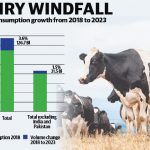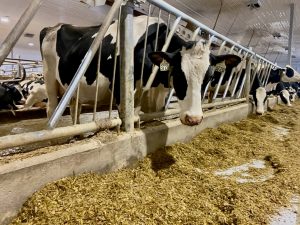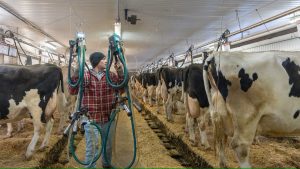
Canada is set to release a replacement for its decade-old food guide next year, and it looks like the document will likely be in line with writer Michael Pollan’s commonly-cited dietary prescription “Eat food. Not too much. Mostly plants.”
But the rumoured minimization of meats and dairy has some food producers concerned the updated guide could cause a blow to their industries and negative health effects to boot.
Tom Kootstra, the chairman of Alberta Milk, is accusing Health Canada of unfairly targeting animal-based proteins and prioritizing vegetarian options for what he describes as “ideological reasons.”
“Initially they were reluctant to hear from industry … because of the perceived bias that these groups would bring to the conversation. But I think they need to realize we all come in with our biases and the obligation of Health Canada is to consider the science,” Kootstra told the Calgary Eyeopener.
Accusations of influence
Health Canada has faced accusations of being influenced by industry groups when compiling Canada’s Food Guide.
One edition of the guide published in the 1990s saw the recommended number of meat and dairy servings increased after industry complaints.
The country’s first-ever food guide was about more than just promoting nutrition — it was created during the Second World War, and included rules that discouraged people from eating foods needed for wartime export.
Later versions promoted the agriculture industry, and some details in the current guide have been criticized by medical professionals, like the suggestion that fruit juice is an acceptable serving of fruit or vegetables.
Debate over protein sources
The updated document’s new guiding principle, established through consultations with the public and health officials but no one-on-one meetings with industry stakeholders, states that Health Canada recommends: “Regular intake of vegetables, fruit, whole grains and protein-rich foods, especially plant-based sources of protein.”
Plant-based proteins contain different forms of dietary iron than meats (non-heme versus heme) and the two forms are absorbed into the body differently.
While there are ways to get adequate sources of iron from just plants, one rancher worries Canadians could be confused by the new rules.
“We don’t want people to be misled thinking they’re getting the equivalent amount of nutrients as they would,” said Tom Lynch-Staunton, a rancher and the government relations manager with Alberta Beef Producers.
“Let’s say you’re eating lentils versus a piece of beef … we know the iron in the lentils will be harder to absorb and you won’t be getting essential nutrients.”
Some ranchers may be concerned but an industry group representing plant-food producers is praising the new focus on environmental sustainability and animal welfare.
“We applaud Health Canada for heeding the growing body of evidence demonstrating that diets rich in plant-based foods are better for human and environmental health,” said Pamela Tourigny, executive director of the Plant Foods Council, in a release.
Health Canada plans to release the revised guide in two phases. In early 2019, part one will contain general healthy-eating recommendations for health professionals and policy makers and later in 2019, part two will consist of healthy eating patterns with recommended amounts and types of foods for the general public.

























